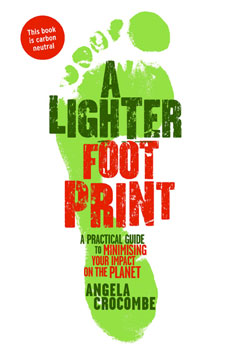Human-driven global warming and consequent climate change are now high in public consciousness. Emission of carbon dioxide from combustion of fossil fuels is widely identified as its major cause. Angela Crocombe has produced this comprehensive guide on how we can reduce our carbon use or "footprint" by individual and local action.
 She has researched widely, and her writing is clear and urgent. Some of her recommendations are obvious, easy to implement and already familiar from popular TV programmes, leaflets from power utilities and government brochures.
She has researched widely, and her writing is clear and urgent. Some of her recommendations are obvious, easy to implement and already familiar from popular TV programmes, leaflets from power utilities and government brochures.
Any strategy that reduces your power and fuel consumption is effective, with the bonus of cost savings. She also discusses carbon offsets and gives a brief overview of alternative energy sources and of options for purchase of accredited "green" energy.
A Lighter Footprint goes well beyond issues of fossil-fuel use, although it is generally present in the background as energy used to grow or manufacture and to transport products.
As with energy, her chapter on water contains much useful advice on reducing consumption. Her chapter on food includes avoidance of cruelty to animals and argues that becoming vegetarian or vegan is best for the environment.
In her chapters on things personal from clothing to cosmetics by way of nappies and toothpaste, she includes a "big baddie" list of chemicals found in products, some of which are "known toxins". It is in these sections that I feel her vigorous advocacy loses balance with the complexities of production, regulation and supply of affordable and safe products to large populations.
This imbalance is also present in her brief and passionate dismissal of nuclear energy. What she says will make you think and is backed by internet references, but the full story often has far more issues to balance and assess than a book of this sort could address.
It is a great reference book, but it would be unwise to let it pull you uncritically into all her ideas.
Her tips for real savings that are obvious and non-controversial are a good place to start reducing your footprint or to confirm what you are already doing. When you venture beyond these, use her internet references and other sources to make judgments about what really is worth acting on and on how supportable some of her choices really are.
For Christians and many others, the most significant issue is to live in right relationship with God and our neighbours. Our prayer book services lead us to pray that we might "share with justice the resources of the Earth". Most of us who read this are caught up in unsustainable patterns of consumption. To live as if this did not matter is to turn our backs on the intention of that prayer.
God loves us by giving us life in the first place and in calling us to new life through the life, death and resurrection of Jesus Christ. Delighting in all creation, caring for our global home, and loving our global neighbours in our own and future generations are core responses to God's love to us.
So I say, be informed and aware. Lots of people making small changes can add up and make a difference not only materially but also as a witness that you care because God first cared for you.
A Lighter Footprint is a handy guide in which you will find many practical things to do that really will make a difference. Use it as a stimulus for thought, discussion and action, but not as the last word on all the issues Crocombe deals with.






















